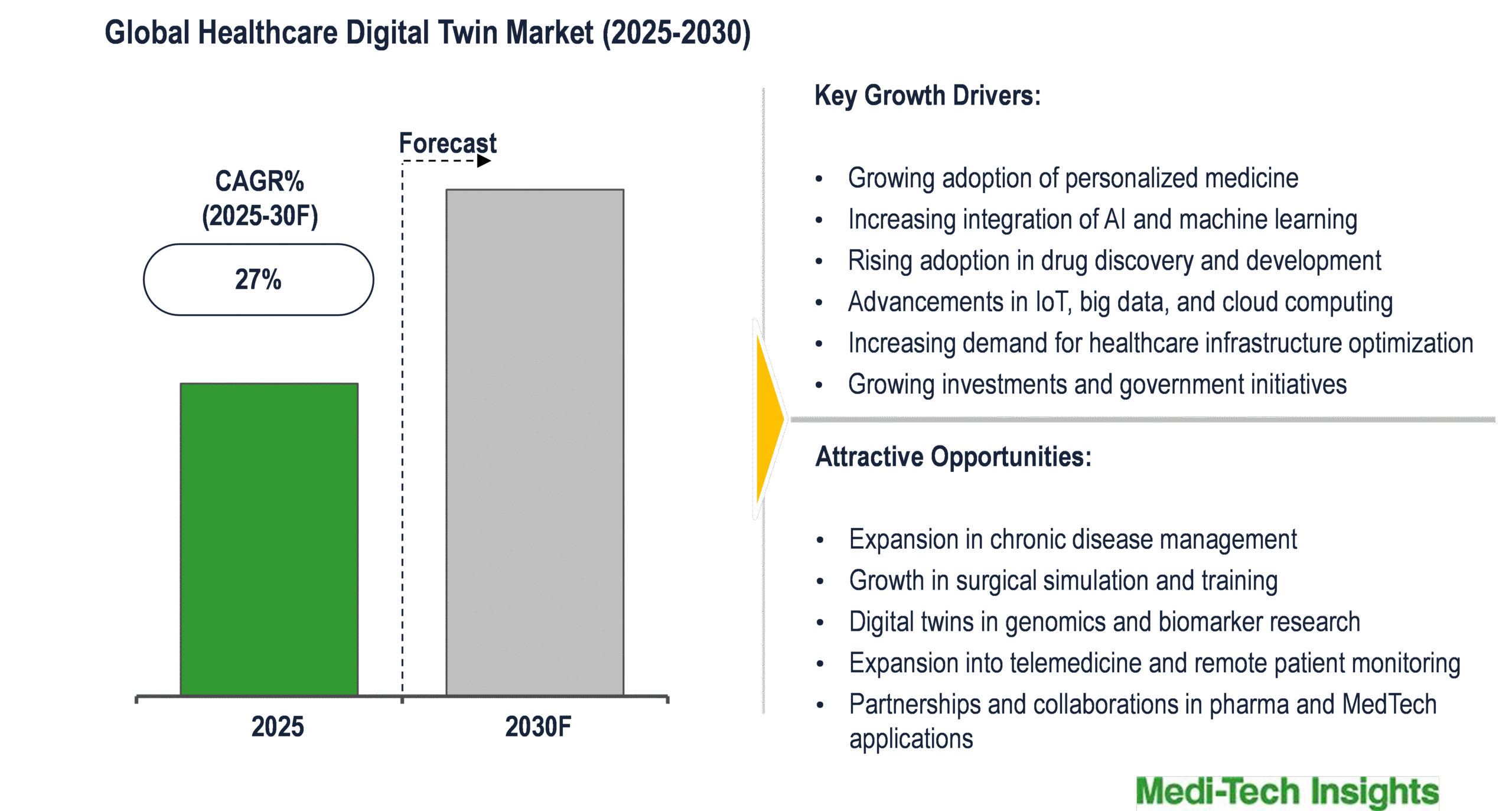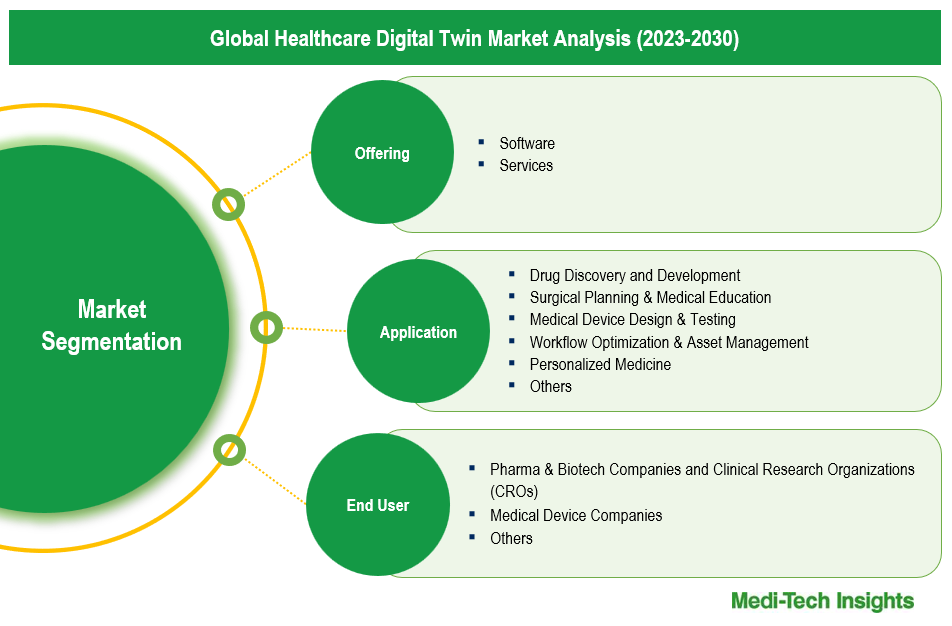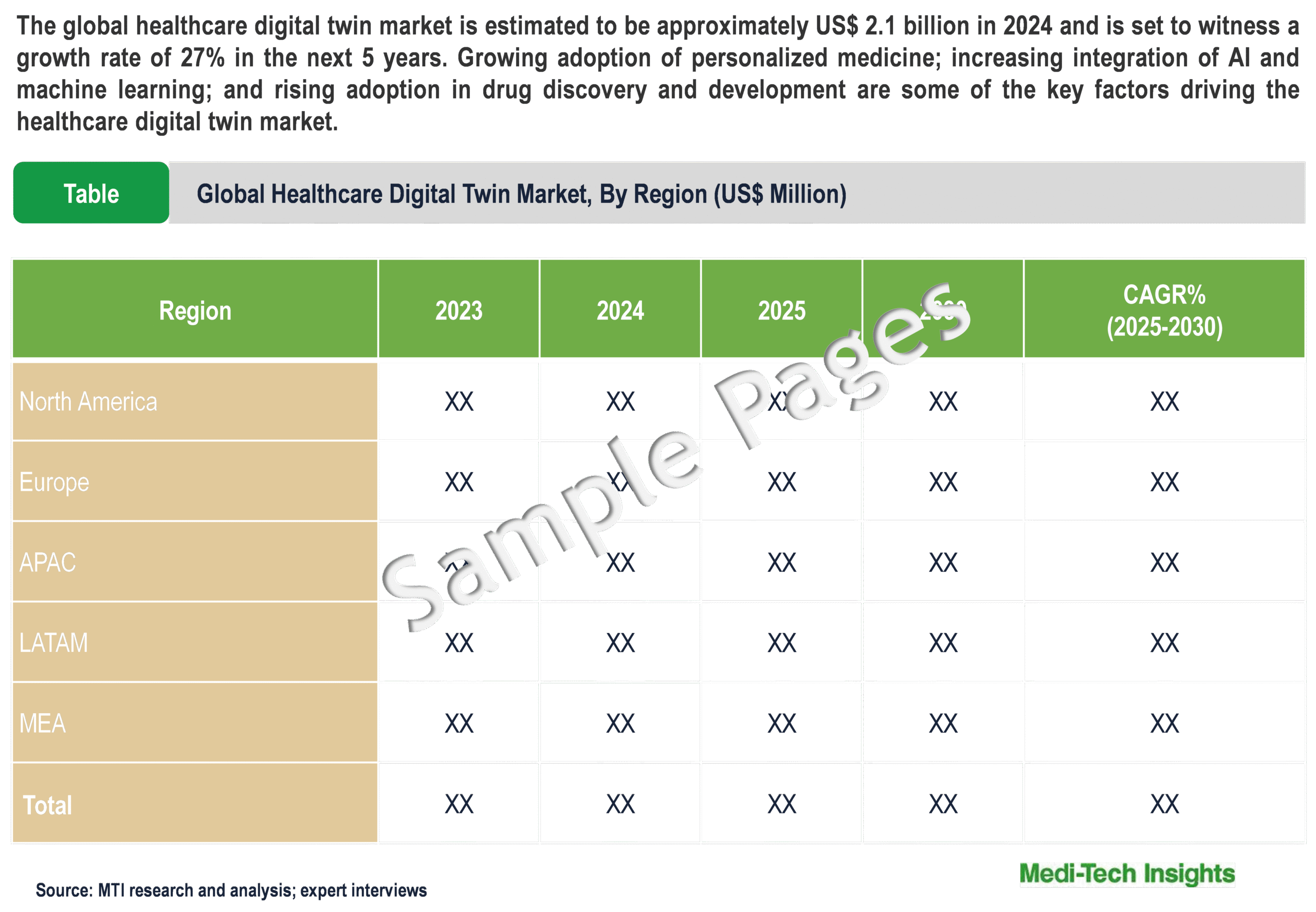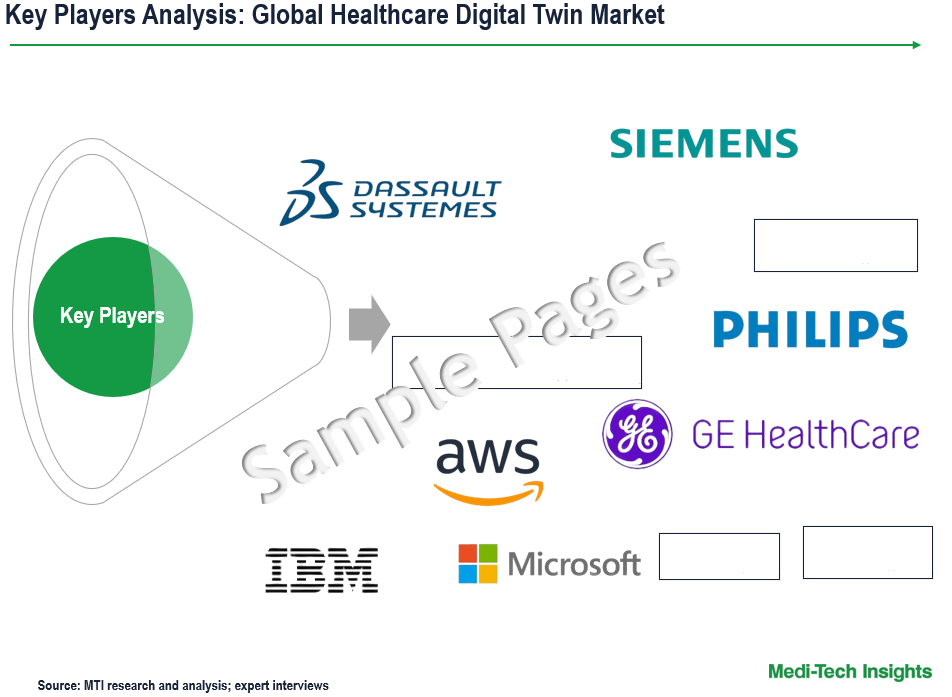
Global Healthcare Digital Twin Market Size & Trends Report Segmented by Agent Type (Non-Ionic, Ionic), Route of Administration (IV, IA, Oral, Rectal), Application (Cardiology, Oncology, Gastroenterology), End User (Hospitals, ASCs) & Regional Forecast to 2030
The global healthcare digital twin market is estimated to be approximately US$ 2.1 billion in 2024 and is set to witness a growth rate of ~27% in the next 5 years. Growing adoption of personalized medicine; increasing integration of AI and machine learning; rising adoption in drug discovery and development; advancements in IoT, big data, and cloud computing; increasing demand for healthcare infrastructure optimization; and growing investments and government initiatives are some of the key factors driving the healthcare digital twin market. To learn more about the research report, download a sample report.
Report Overview
A healthcare digital twin is a virtual replica of a patient, medical device, or healthcare system that uses real-time data, AI, and analytics to simulate, predict, and optimize health outcomes. It integrates data from medical records, wearables, imaging, and genomics to create personalized models for disease progression, treatment planning, and drug discovery. Digital twins enhance precision medicine, optimize hospital operations, and improve medical training through simulations. By enabling predictive analytics and remote monitoring, they support early diagnosis, personalized therapies, and operational efficiency, revolutionizing patient care and healthcare innovation while reducing costs and improving overall treatment effectiveness.

To learn more about this report, download the PDF brochure
Growing adoption of personalized medicine to propel market demand
The growing adoption of personalized medicine is driving the healthcare digital twin market by enabling tailored treatment strategies based on individual patient data. Digital twins create virtual patient models using genomics, biometrics, and real-time health data, allowing clinicians to simulate disease progression and predict treatment responses. This enhances precision medicine, optimizing drug dosages, therapy selection, and surgical planning. Additionally, digital twins help in early disease detection, remote monitoring, and chronic disease management, reducing trial-and-error treatments. As demand for customized healthcare solutions rises, digital twin technology is becoming essential for improving patient outcomes and accelerating drug development.
Rising adoption in drug discovery and development is driving the market growth
The rising adoption of digital twins in drug discovery and development is driving market growth by enhancing virtual testing, predictive modeling, and personalized drug design. Digital twins simulate disease progression, drug interactions, and patient responses, reducing reliance on costly and time-consuming clinical trials. By integrating AI, big data, and real-world patient data, they help pharmaceutical companies identify promising drug candidates, optimize formulations, and predict adverse effects. This accelerates FDA approvals, improves trial success rates, and lowers R&D costs. As pharma companies increasingly adopt AI-driven simulations, digital twins are revolutionizing precision medicine and therapeutic innovations.

To learn more about this report, download the PDF brochure
Competitive Landscape Analysis
The global healthcare digital twin market is marked by the presence of established and emerging market players such as Amazon Web Services, Inc., Certara; ANSYS, Inc., Oracle, GE Healthcare, Atos, Siemens, IBM Corporation, Microsoft Corporation, Philips Healthcare, and Dassault Systèmes; among others. Some of the key strategies adopted by market players include new product development, strategic partnerships and collaborations, and geographic expansion.
Report Scope
|
Report Metric |
Details |
|
Base Year Considered |
2024 |
|
Historical Data |
2023 - 2024 |
|
Forecast Period |
2025 - 2030 |
|
Growth Rate |
27% |
|
Market Drivers |
|
|
Attractive Opportunities |
|
|
Segment Scope |
Offering, Application, End User |
|
Regional Scope |
|
|
Key Companies Mapped |
Amazon Web Services, Inc.; Certara; ANSYS, Inc.; Oracle; GE Healthcare; Atos; Siemens; IBM Corporation; Microsoft Corporation; Philips Healthcare; and Dassault Systèmes among others |
|
Report Highlights |
Market Size & Forecast, Growth Drivers & Restraints, Trends, Competitive Analysis |
Global Healthcare Digital Twin Market Segmentation
This report by Medi-Tech Insights provides the size of the global healthcare digital twin market at the regional- and country-level from 2023 to 2030. The report further segments the market based on offering, application, end user.
Market Size & Forecast (2023-2030), By Offering, USD Million
- Software
- Services
Market Size & Forecast (2023-2030), By Application, USD Million
- Drug Discovery and Development
- Surgical Planning & Medical Education
- Medical Device Design & Testing
- Workflow Optimization & Asset Management
- Personalized Medicine
- Others
Market Size & Forecast (2023-2030), By End User, USD Million
- Pharma & Biotech Companies and Clinical Research Organizations (CROs)
- Medical Device Companies
- Others
Market Size & Forecast (2023-2030), By Region, USD Million
- North America
- US
- Canada
- Europe
- UK
- Germany
- France
- Italy
- Spain
- Rest of Europe
- Asia Pacific
- China
- India
- Japan
- Rest of Asia Pacific
- Latin America
- Middle East & Africa
Key Strategic Questions Addressed
- What is the market size & forecast of the healthcare digital twin market?
- What are historical, present, and forecasted market shares and growth rates of various segments and sub-segments of the healthcare digital twin market?
- What are the key trends defining the market?
- What are the major factors impacting the market?
- What are the opportunities prevailing in the market?
- Which region has the highest share in the global market? Which region is expected to witness the highest growth rate in the next 5 years?
- Who are the major players operating in the market?
- What are the key strategies adopted by players?
- Introduction
- Introduction
- Market Scope
- Market Definition
- Segments Covered
- Regional Segmentation
- Research Timeframe
- Currency Considered
- Study Limitations
- Stakeholders
- List of Abbreviations
- Key Conferences and Events (2025-2026)
- Research Methodology
- Secondary Research
- Primary Research
- Market Estimation
- Bottom-Up Approach
- Top-Down Approach
- Market Forecasting
- Executive Summary
- Healthcare Digital Twin Market Snapshot (2025-2030)
- Segment Overview
- Regional Snapshot
- Competitive Insights
- Market Overview
- Market Dynamics
- Drivers
- Growing adoption of personalized medicine
- Increasing integration of AI and machine learning
- Rising adoption in drug discovery and development
- Advancements in IoT, big data, and cloud computing
- Increasing demand for healthcare infrastructure optimization
- Growing investments and government initiatives
- Restraints
- High implementation costs
- Data privacy and security concerns
- Interoperability issues
- Limited awareness and adoption among healthcare providers
- Opportunities
- Expansion in chronic disease management
- Growth in surgical simulation and training
- Digital twins in genomics and biomarker research
- Expansion into telemedicine and remote patient monitoring
- Partnerships and collaborations in pharma and MedTech applications
- Key Market Trends
- Integration with genomics and biomarker research
- Increasing adoption in regenerative medicine and organ simulation
- Unmet Market Needs
- Industry Speaks
- Drivers
- Market Dynamics
- Global Healthcare Digital Twin Market Size & Forecast (2023-2030), By Offering, USD Million
- Introduction
- Software
- Service
- Global Healthcare Digital Twin Market Size & Forecast (2023-2030), By Application, USD Million
- Introduction
- Drug Discovery and Development
- Surgical Planning & Medical Education
- Medical Device Design & Testing
- Workflow Optimization & Asset Management
- Personalized Medicine
- Others
- Global Healthcare Digital Twin Market Size & Forecast (2023-2030), By End User, USD Million
- Introduction
- Pharma & Biotech Companies and Clinical Research Organizations (CROs)
- Medical Device Companies
- Others
- Global Healthcare Digital Twin Market Size & Forecast (2023-2030), By Region, USD Million
- Introduction
- North America Healthcare Digital Twin Market Size & Forecast (2023-2030), By Country, USD Million
- US
- Market Size & Forecast, By Offering (USD Million)
- Market Size & Forecast, By Application (USD Million)
- Market Size & Forecast, By End User (USD Million)
- Canada
- Market Size & Forecast, By Offering (USD Million)
- Market Size & Forecast, By Application (USD Million)
- Market Size & Forecast, By End User (USD Million)
- US
- Europe Healthcare Digital Twin Market Size & Forecast (2023-2030), By Country, USD Million
- UK
- Market Size & Forecast, By Offering (USD Million)
- Market Size & Forecast, By Application (USD Million)
- Market Size & Forecast, By End User (USD Million)
- Germany
- Market Size & Forecast, By Offering (USD Million)
- Market Size & Forecast, By Application (USD Million)
- Market Size & Forecast, By End User (USD Million)
- France
- Market Size & Forecast, By Offering (USD Million)
- Market Size & Forecast, By Application (USD Million)
- Market Size & Forecast, By End User (USD Million)
- Italy
- Market Size & Forecast, By Offering (USD Million)
- Market Size & Forecast, By Application (USD Million)
- Market Size & Forecast, By End User (USD Million)
- Spain
- Market Size & Forecast, By Offering (USD Million)
- Market Size & Forecast, By Application (USD Million)
- Market Size & Forecast, By End User (USD Million)
- Rest of Europe
- Market Size & Forecast, By Offering (USD Million)
- Market Size & Forecast, By Application (USD Million)
- Market Size & Forecast, By End User (USD Million)
- UK
- Asia Pacific (APAC) Healthcare Digital Twin Market Size & Forecast (2023-2030), By Country, USD Million
- China
- Market Size & Forecast, By Offering (USD Million)
- Market Size & Forecast, By Application (USD Million)
- Market Size & Forecast, By End User (USD Million)
- Japan
- Market Size & Forecast, By Offering (USD Million)
- Market Size & Forecast, By Application (USD Million)
- Market Size & Forecast, By End User (USD Million)
- India
- Market Size & Forecast, By Offering (USD Million)
- Market Size & Forecast, By Application (USD Million)
- Market Size & Forecast, By End User (USD Million)
- Rest of Asia Pacific
- Market Size & Forecast, By Offering (USD Million)
- Market Size & Forecast, By Application (USD Million)
- Market Size & Forecast, By End User (USD Million)
- China
- Latin America (LATAM) Healthcare Digital Twin Market Size & Forecast (2023-2030), USD Million
- Market Size & Forecast, By Offering (USD Million)
- Market Size & Forecast, By Application (USD Million)
- Market Size & Forecast, By End User (USD Million)
- Middle East & Africa (MEA) Healthcare Digital Twin Market Size & Forecast (2023-2030), USD Million
- Market Size & Forecast, By Offering (USD Million)
- Market Size & Forecast, By Application (USD Million)
- Market Size & Forecast, By End User (USD Million)
- Competitive Landscape
- Key Players and their Competitive Positioning
- Key Player Comparison
- Segment-wise Player Mapping
- Market Share Analysis (2024)
- Company Categorization Matrix
- Dominants/Leaders
- New Entrants
- Emerging Players
- Innovative Players
- Key Strategies Assessment, By Player (2022-2025)
- New Product and Service Launches
- Partnerships, Agreements, & Collaborations
- Mergers & Acquisitions
- Geographic Expansion
- Key Players and their Competitive Positioning
- Company Profiles*
(Business Overview, Financial Performance**, Products Offered, Recent Developments)
- Amazon Web Services, Inc.
- Certara
- ANSYS, Inc.
- Oracle
- GE Healthcare
- Atos
- Siemens
- IBM Corporation
- Microsoft Corporation
- Philips Healthcare
- Dassault Systèmes
- Other Prominent Players
Note: *Indicative list
**For listed companies
The study has been compiled based on extensive primary and secondary research.
Secondary Research (Indicative List)

Primary Research
To validate research findings (market size & forecasts, market segmentation, market dynamics, competitive landscape, key industry trends, etc.), extensive primary interviews were conducted with both supply and demand-side stakeholders.
Supply Side Stakeholders:
- Senior Management Level: CEOs, Presidents, Vice-Presidents, Directors, Chief Technology Officers, Chief Commercial Officers
- Mid-Management Level: Product Managers, Sales Managers, Brand Managers, R&D Managers, Business Development Managers, Consultants
Demand Side Stakeholders:
- Stakeholders from Introduction, Pharma & Biotech Companies and Clinical Research Organizations (CROs); Medical Device Companies; and Others
Breakdown of Primary Interviews

Market Size Estimation
Both ‘Top-Down & Bottom-Up Approaches’ were used to derive market size estimates and forecasts
Data Triangulation
Research findings derived through secondary sources & internal analysis was validated with Primary Interviews, Internal Knowledge Repository and Company’s Sales Data



